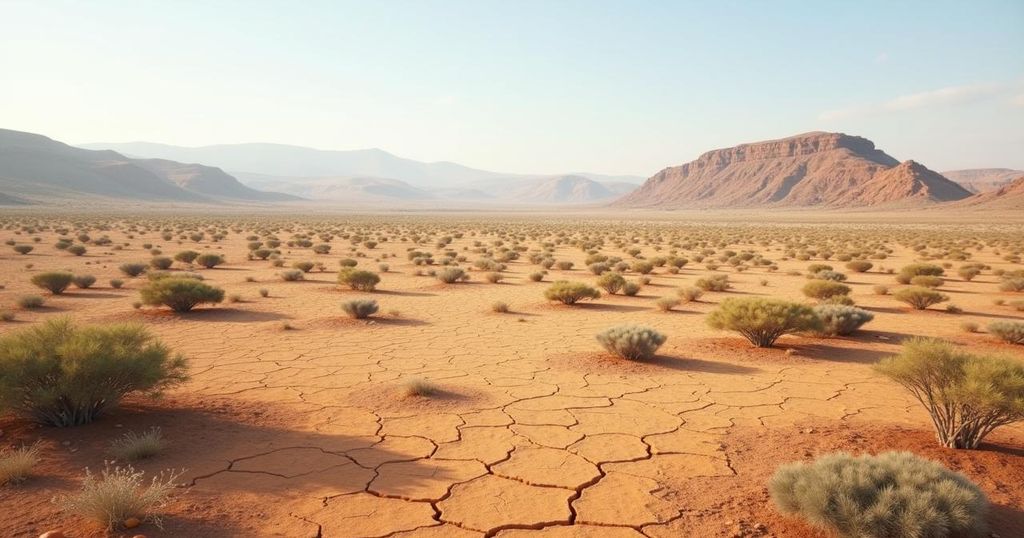The 2023/2024 El Niño event has triggered one of the worst droughts in Southern Africa in 40 years, leading to severe food shortages, water scarcity, and health crises, affecting nearly 23 million people. Nations like Malawi, Zambia, Zimbabwe, and Mozambique are particularly impacted, prompting urgent humanitarian assistance. The crisis, compounded by existing cholera outbreaks and ongoing conflicts, necessitates immediate coordinated responses to alleviate suffering and address vulnerable populations.
The ongoing drought crisis in Southern Africa, intensified by the 2023/2024 El Niño event, has created devastating humanitarian challenges across the region. This particular El Niño is noted as the most severe occurrence in the last four decades, significantly affecting communities that are already grappling with adverse economic conditions and failed agricultural production. The resultant drought has sparked severe food shortages, compromised access to safe drinking water, the emergence of disease outbreaks, and the loss of livestock, leading to catastrophic living conditions for millions. According to estimates from both national governments and FEWS NET, maize harvests across southern Africa are projected to be well below the five-year average, exacerbating the food crisis. Alarmingly, approximately 23 million individuals are currently experiencing high levels of food insecurity, with the hardest-hit nations including Malawi, Zambia, Zimbabwe, and Mozambique. FEWS NET projects that between 14.0 to 14.9 million individuals will require immediate humanitarian relief during the upcoming lean season from October to December of 2024. In addition, six countries—Namibia, Botswana, Lesotho, Malawi, Zambia, and Zimbabwe—have officially declared national drought disasters. Angola and Mozambique are also feeling severe impacts, with an estimated 1.8 million people in Angola and 3.3 million in Mozambique facing food insecurity. Furthermore, over two million children are anticipated to be acutely malnourished in 2024, with over 500,000 suffering from severe wasting—a critical condition requiring urgent attention. The harsh drought conditions have resulted in the displacement of thousands of individuals and have triggered outbreaks of various diseases amidst ongoing challenges with water supply. This drought has compounded existing health risks in a region already plagued by one of the worst cholera outbreaks in years, particularly affecting countries like Malawi and Mozambique. While cholera cases have somewhat stabilized, the persistent water shortages continue to undermine efforts toward hygiene and sanitation, which are critical to curbing further outbreaks. Additionally, the adverse effects of drought are expected to escalate the transmission of HIV/AIDS, exacerbate mental health issues, and lead to increased gender-based violence—illustrating the pressing need for enhanced preparedness and response initiatives. The interconnected challenges posed by El Niño, ongoing cholera crises, conflicts, and climate change have severely strained health systems across Southern Africa, further limiting access to critical sexual and reproductive health services. As a result, over one million individuals have been internally displaced due to climate-induced disasters, primarily originating from Malawi, Mozambique, and Zimbabwe. Therefore, the combination of these multifaceted crises signals an urgent call to action for humanitarian efforts to address and support the affected populations in Southern Africa. The ongoing drought crisis necessitates a comprehensive and coordinated response to alleviate the suffering of millions.
The Southern Africa region is facing an unprecedented drought, primarily attributed to the severe effects of the 2023/2024 El Niño phenomenon. El Niño events are known to disrupt weather patterns drastically, often leading to droughts and food shortages. In this context, several nations including Angola, Botswana, Lesotho, Malawi, Mozambique, Namibia, Zambia, and Zimbabwe have been profoundly impacted by the resultant adverse conditions. The drought is exacerbating existing vulnerabilities in these communities, such as economic hardships and pre-existing health crises, notably the cholera outbreak that had already been affecting the area prior to the drought. The convergence of these issues—drought, food insecurity, disease outbreaks, and attendant challenges—underscores the need for urgent interventions and effective humanitarian assistance to mitigate the effects on the affected populations.
In conclusion, the drought crisis in Southern Africa, exacerbated by the ongoing El Niño event, poses significant humanitarian challenges to millions of individuals and families across the region. With severe food shortages, water scarcity, and devastating health risks including cholera outbreaks and malnutrition, the situation calls for immediate and coordinated humanitarian efforts. The need for comprehensive strategies to tackle these overlapping crises is critical, especially in Light of the existing vulnerabilities faced by the region’s communities. Thus, addressing the intricacies of this drought crisis is vital in promoting recovery and long-term resilience against future environmental challenges.
Original Source: reliefweb.int






